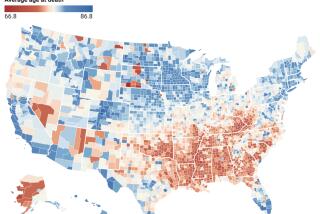Medicaid may help people live longer, study indicates
WASHINGTON – As states consider whether to expand their Medicaid insurance programs for the poor under President Obama’s healthcare law, new research indicates the decision may have life-and-death consequences.
A study published Wednesday in the New England Journal of Medicine indicates that residents of states that expand coverage will probably live longer, be healthier and have better access to medical care.
Researchers at the Harvard School of Public Health, who compared states that voluntarily expanded their Medicaid programs over the last decade with neighboring states that did not, found mortality rates were more than 6% lower in states with more generous coverage.
Residents of those states were also far less likely to delay needed care because of cost and more likely to report that they were in good health.
“Policymakers should be aware that major changes in Medicaid, either expansions or reductions in coverage, may have significant effects on the health of vulnerable populations,” the authors wrote in their conclusion. The lead author, Dr. Benjamin D. Sommers, is now advising the Department of Health and Human Services, but he wrote the article while at Harvard, and it does not reflect government views, according to a note accompanying the piece.
The Affordable Care Act that Obama signed two years ago is slated to provide states with hundreds of billions of dollars to open their Medicaid program to all poor residents starting in 2014. In most states, the program is largely limited to poor families, poor seniors and the disabled.
The planned coverage expansion, which was expected to add at least 17 million uninsured adults to the Medicaid rolls over the next decade, is now in doubt, however, after last month’s Supreme Court ruling on the healthcare law.
While upholding the law, the court ruled that states could decline the federal money and maintain more limited Medicaid eligibility. Several Republican governors – including those in states with large uninsured populations, such as Texas and Florida – have already indicated they will reject the Medicaid expansion.
Some conservative critics of Medicaid have hailed that decision, arguing the program does a poor job of guaranteeing healthcare to the needy.
Even defenders of Medicaid, which already provides insurance to nearly 70 million people in a year, say it needs major improvement. But the new study suggests that the program still provides important protections to needy Americans.
That research was made possible by the decisions of New York, Arizona and Maine to open their Medicaid programs to poor adults without children in 2001 and 2002. That contrasted with the neighboring states of New Hampshire, Pennsylvania, Nevada and New Mexico, which provided a natural control group that researchers used to compare death rates and other indicators.
That methodology contrasts with controversial studies that have cast doubt on the efficacy of Medicaid by showing that Medicaid enrollees fare as badly or worse in the hospital as those without insurance. Those findings have drawn fire from many critics who question the link between poor outcomes and the program.
By contrast, the new study parallels the findings of a unique study of Oregon residents who won a lottery in 2008 to get Medicaid coverage, allowing researchers to compare them against a similar population that did not get coverage. The new enrollees in Oregon Medicaid also reported better health and better access to medical care.
Follow Politics Now on Twitter
Twitter: @NoamLevey







